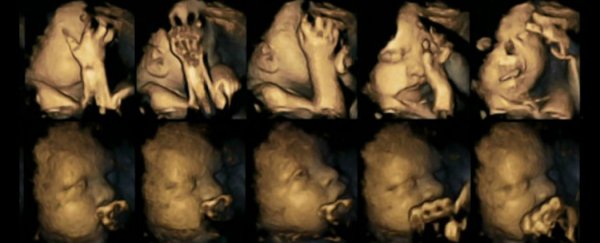A pilot study involving a small group of expectant mothers in the UK has revealed the strange impact of smoking while pregnant on a developing foetus.
Led by Nadja Reissland from Durham University, an expert on early mother-infant interaction, the study followed 20 pregnant women, four of whom smoked an average of 14 cigarettes a day, over the course of 36 weeks. At 24, 28, 32, and 36 weeks, each woman submitted to a 4D ultrasound scan at the James Cook University Hospital in Middlesbrough to record the thousands of tiny movements made by their unborn child.
As Reissland explains in the video below, healthy foetuses start out touching themselves around the head and face, and moving their mouths in all kinds of shapes, as they explore all the new limbs and body parts that now belong to them. But as their central nervous systems continue to develop, giving them greater control over their bodies, these movements become less frequent.
What Reissland found when comparing the scans is that these frequent touching and mouth movements continued in the foetuses of smoking mothers, while the foetuses of the non-smoking mothers had calmed down. This suggests, says Reissland, that smoking during pregnancy could delay the development of a child's central nervous system, but she's cautious to make any definitive statements until she can gather together a larger sample size and confirm the results.
"A larger study is needed to confirm these results and to investigate specific effects, including the interaction of maternal stress and smoking," she told Rose Troup Buchanan at The Independent. The results of her study have been published in Acta Paediatrica.
While smoking during pregnancy is certainly a declining trend, it still affects many unborn children around the world. According to a report by researchers at the University of New South Wales (UNSW) in 2010, in Australia, 14.5 percent of women reported smoking while pregnant, while one in six of them said they managed to quit before the baby was born.
But according to the Royal Australian College of General Practitioners, "The real prevalence of smoking is likely to be higher, as up to 25 percent of pregnant smokers do not disclose their smoking status, often because of the social stigma."
And these figures can change dramatically depending on where the mother is living. For example, The Independent reports that between 2013 and 2014, 28 percent of pregnant women who visited the Blackpool Victoria Hospital in Lancashire, England reportedly smoked during their pregnancy, while just 2 percent of expectant mothers living in central London reported to smoke.
Reissland said the point of her study is not to shame or demonise mothers who smoke, but to give them the tools and education they need to help them quit.

Source: The Independent
